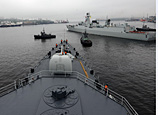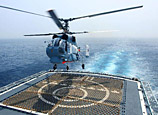
Ding said he had talked to Chirkov about more cooperation programs between the two navies in the near future.
Holding joint exercises is a complicated task, especially drills that involve more than 4,000 people such as the "Joint Sea 2013", Ding said. " But the results of the exercise have proven that China and Russia are good neighbors, friends and partners, and have laid a foundation for further cooperation in the future."
Large drills can offer "many benefits", including a rare opportunity for both sides to learn from each other, Sukhanov said.
Chi Qingtao, a senior officer of the Chinese task forces, said it was the first time Chinese task forces have practiced shooting parachute targets — a specialty of the Russian navy — during a drill.
"It was indeed a challenge for us. ... But we prepared six plans based on different winds speeds and hit them in a flash," he said.
"The navy shoulders the responsibility of safeguarding our maritime rights, but we won't provoke regional tension despite the growing strength."
The two navies are scheduled to conduct evaluations of the exercises on Thursday. The Chinese task forces, which arrived in Vladivostok on July 5, will leave on Friday.

















 Wild Siberian tiger kills cattle in NE China
Wild Siberian tiger kills cattle in NE China


![]()
